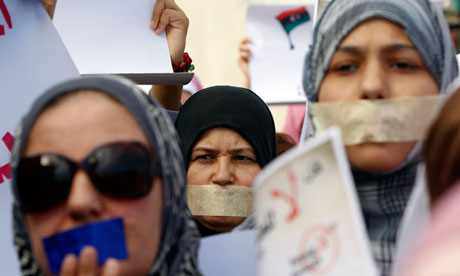Violence Against Women
Source: The Guardian
When Hussein was searching desperately for his son in the last days of the 2011 revolution that toppled Libya's dictator, Colonel Muammar Gaddafi, he was told of a villa in Tripoli. He and other anti-government fighters went there on 20 August.
They found nothing. At first.
But inside was a massive door that it took them a long time to open. "Beyond it was a long, shallow flight of stairs – about 80 in all," says Hussein, 57, whose full name is being withheld at his request.

At the bottom was a torture chamber, including apparatus for electrocution. Beyond was a corridor lined with cells.
"When we broke into the cells, we were astonished," says Hussein. "The first three were full of naked women – maybe 35 in all."
He and his companions could not have guessed, but they were setting in train a sequence of events that has led to the drafting of a bill that Libya's new leaders and NGOs believe is a world first. It would make rape during armed conflict a war crime.
"It has already been discussed in committee," says Juma Ahmad Atigha, deputy president of the general national congress (GNC). "In a few weeks it will be put to a vote in the GNC."
Atigha, who was in Rome this week for a conference on reconciliation in the Arab spring countries, points out that rape is already a crime under Libyan law. "The usual sentence is around 10 years," he says. But rapists convicted under the proposed new law would face life.
It has yet to be decided whether those affected would be entitled to a war pension. But, says Atigha, it was agreed that they should get lump-sum compensation from the state. "That is a must. The plan is for the courts to set the level of compensation case by case. Among the criteria would be whether a pregnancy resulted from the rape and the severity of the injuries suffered by the victim. Some of these women died."
Getting the bill to this stage was not easy, Atigha says. "Ours is a conservative society and anything that has to do with women is very sensitive. Rape is a very big scandal for a family, even though the woman has been forced: it is an attack on the dignity of the family, and the tribe to which it belongs.
"But that is why the regime used rape. So it was logical to regard it as a war crime."
The number of women affected ran into the hundreds, according to Atigha. Nicoletta Gaida, president of the Ara Pacis Initiative, an Italian NGO, thought it could be thousands.
The turning point for the bill came at a conference in Tripoli on 4 May, Gaida says. Her NGO and a Libyan one, the Observatory on Gender in Crisis, had arranged for one of the women freed by Hussein to be present.
Defying the taboos of Libyan society, she stood up and – in appalling detail – told her story.
"She was one of three sisters who, in the early stages of the revolution, had put an anti-Gaddafi post on Facebook," says Gaida. "They were arrested. For nine months, she was sexually tortured with everything you can imagine. When you say rape you think of a man violating a woman. But this was far, far worse."
By the time the young woman had finished her account, the Libyan minister of justice and several other men present were in tears. "It was then that she turned to the minister and asked him: 'What will you do for us?'", Gaida recalls. "The minister stood up and said: 'You and your sisters are the pearls in the crown of the new Libya'."
The idea that the survivors of rape might be thought of as anything but a source of disgrace was a drastic break with the past, and helped the bill being pushed by the Observatory on Gender in Crisis to get the government's backing.
"The main problem once the law has been passed will still be a cultural one," says Atigha. "We know many victims prefer to keep what happened a secret. One thing we want to do is to ensure cases are dealt with by female investigating magistrates."
